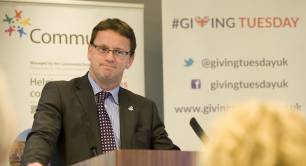Keep the faith: analysing the landscape of faith-based charities in the UK
We are in the midst of Christian Aid Week. The charity has mobilised nearly 100,000 people to support its work, from holding events to rattling tins for small donations. In London, the iconic St Martin-in-the-fields has been decorated with a large banner, spreading the word of the charity and the poverty relief work it pursues all over the world.
Pop along to the Christian Aid website and you’ll find a reaffirmation of their religious mission: its ‘work is founded on Christian faith, inspired by hope and acts to change an unjust world through charity’.
Christian Aid is one of the UK’s most famous faith-based charities, the sort big enough to merit a week dedicated to itself. But this throws into relief a key question (and which New Philanthropy Capital intends to consider in the weeks and months to come).
While we know a fair bit about how religion influences people’s tendency to donate (religious people give more) and volunteer (faith makes relatively little difference), we are not so clear about how faith manifests itself in the approach, relationships, activities and experiences of charities themselves.
At one time the UK population was religious by default. Charitable work was inextricable from religious devotion and charities were ‘faith-based’ by their very nature. Today the picture has changed a great deal, and in some unexpected ways.
Despite an increasingly secular society – the number of people professing no religion grew by more than 6m between the 2001 and 2011 census – the total religious charities in the UK has now grown to 32,000, up 9,000 on eight years ago.
This is a group of charities which deserve closer attention. In some recent cases, this has meant an unwelcome interrogation of their motives. It certainly isn’t a great idea to start separating out faith-based organisations as if they are detached from the rest of the sector. They aren’t. Of much greater relevance are the unique qualities and perspectives they bring to charity work as a whole, and the lessons for the whole sector in where religious charities excel in getting help to beneficiaries.
This is the focus of the programme NPC is just starting in earnest. We published a short paper at the end of last year. We also brought together some of the great and good of the faith world to discuss what religious organisations bring to charity and how the landscape of faith-based charities looks today.
Do charities of different faiths gravitate towards certain social issues, for example? (One might think of food banks, and the founding Christian principles of the largest organising body, the Trussell Trust). And as the UK shifts towards a greater mixture of faiths, how will this impact the landscape of charity services in the future?
Does a strong religious connection allow faith-based organisations to reach further into communities that are otherwise neglected? Does faith affect the willingness and success of charities in bidding for public contracts and other funding sources?
Hopefully this project can shed light on all the components which make the voluntary sector work. Staff, trustees, funders and even commissioners all have a role in understanding and responding to the role of faith in doing social good.
For charities themselves, more research can build-up knowledge of the landscape in which they work, and help them discover which motivations they share with their peers (as well as the areas where motivations diverge). If this helps develop a more collective, collaborative approach to charity work, then that’s a substantial step forward. There are implications for good governance, too: trustees need to be aware of which activities and elements based on faith are vital to retain as charities grow, adapt and develop new activities.
Our hypothesis is that faith-based charities can do good in ways that other charities cannot, and that a religious mission comes with its limitations too. To look at just one measure of a charity’s success, religion could both enhance or curtail an organisation’s reach according to the networks they can access and how they are used.
But at the moment it’s a hypothesis without hard evidence to support it. The next step is to let the work unfold, examine what sort of environment enables charities to create the greatest impact, and discover under what kind of circumstances the unique qualities of faith-based organisations play out.
Photo credit: Yorkshire Photo Walks
NPC is embarking on a national programme of work to explore these questions, covering England, Wales and Scotland. It intends to use data analysis, interviews and a national survey to create a clearer picture.



